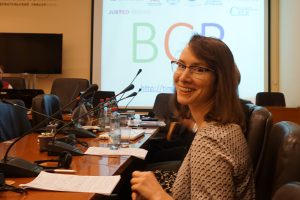 Members of the BCR research consortium travelled to the project’s partner university in Moscow at the end of November to present the results of the four-year comparative study of the politics of education quality evaluation in Brazil, China and Russia. The BCR project held a research seminar on Nov 28 at the National Research University – Higher School of Economics in Moscow, Russia.
Members of the BCR research consortium travelled to the project’s partner university in Moscow at the end of November to present the results of the four-year comparative study of the politics of education quality evaluation in Brazil, China and Russia. The BCR project held a research seminar on Nov 28 at the National Research University – Higher School of Economics in Moscow, Russia.
The title of the seminar was “Changes in the politics of education quality evaluation: a comparative research of Brazil, China and Russia”. The presenters discussed how the international agenda on quality and its evaluation has changed national policies, and how this affected the basic conditions in which school education functions in Brazil, China, and Russia.
The seminar included four presentations, and enjoyed the attention of Russian education researchers and media. It was broadcasted online to engage a wider audience.
First, the consortium leader Jaakko Kauko (University of Tampere) outlined the theoretical and methodological grounding of the research project, and its key results.
Vera Centeno’s (University of Tampere) presentation “Participation of Brazil, China, and Russia in international large-scale international assessments: reasons to participate and changes produced” described the broad context of the implementation of quality assurance and evaluation reforms in the three countries.
Johanna Kallo (University of Turku) presented some results of the project from China in a talk titled “Reforms of Chinese education in the context of global trends in quality assurance and evaluation: reflections on the past, present and future”.
Finally, Galina Gurova (University of Tampere) provided a glimpse at the local level of the study, discussing the “Reactions of schools in Russia to the changes in quality evaluation policy”. The presenters and other consortium participants – Helena Dobrochinski Candido (University of Tampere), Olli Suominen (University of Turku) and Tuomas Takala (University of Tampere) – then engaged in a lively discussion of the project results with the seminar discussants and participants.
The interest for quality evaluation and the background of the BCR project lies in the fact that in recent decades, the issue of education quality has enjoyed increasing interest of international organisations and national policy-makers. Evaluation and data collection is framed as the key to quality assurance in education, so evaluation activities are growing in number and importance. They currently include large-scale assessments of student achievement, performance evaluation of school personnel, various rankings, inspections, and many more. While these activities aim to inform policy-making and stimulate improvements in teaching, international research shows that they produce controversial effects, and in some cases may undermine quality.
Text: Galina Gurova
Photo credit: Helena Candido
